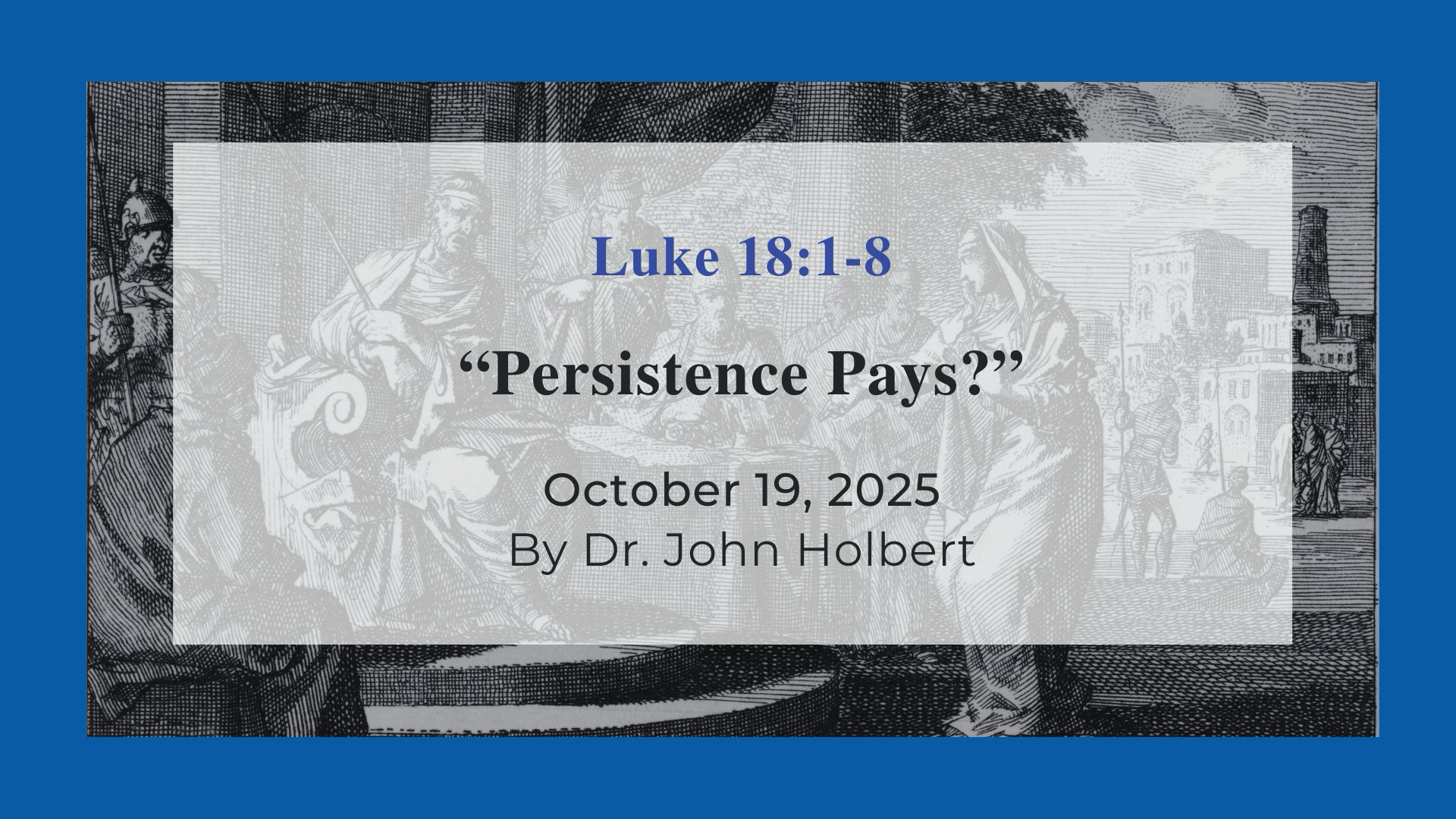Persistence Pays? Reflections on Luke 18:1-8, Pentecost 19, Year C
by John C. Holbert on Saturday, June 21, 2025

This week and next we will examine two parables, unique to Luke, the first of which is directed at the need for prayer always. It is a positive story, and quite a funny one. The Gospels are not known for their humor (although straining at gnats and swallowing camels is not bad), but there is genuine fun in this brief tale about a very persistent widow and a very nasty judge. The second story, which we will peruse next week, is a rather more sober one, though not without its rather sardonic side.
Luke quickly gives the game away about just why this parable is told. “He told them a parable about their need to pray always and not lose heart” (or “without giving up” it might be understood)—Luke 18:1. It is perhaps no surprise that Luke places this story here at this particular point in his gospel narrative. The previous chapter focused on the coming kingdom of God—still not exactly here—and a rather fearful eschatological series of references to tales from Genesis—Noah and the terrible flood and Lot and the destruction of Sodom. In the face of those stories of a scary past as a possible prefiguring of a scary future, some hopeful words about prayer are certainly welcome.
Yet, the story itself is far from a pious reminder that one ought to pray to God always. Instead, it is a rather raucous account of a loud-mouth widow and a quite monstrous judge. First, the judge, or more literally, “a certain judge in a certain city” (Luke 18:2). In other words, this is a stock character, easily recognizable to the hearers. Well, not quite as “stock” as we first might think. He is, in fact, a truly terrible and horrifying excuse for a judge that no one would care to see in a courtroom. “He did not fear God.” All knew that to “fear God” is to have access to genuine wisdom, as Prov.1:7, and many other texts, aver. This judge cares nothing for the source of all righteousness and justice, God. Moreover, “he had no regard for people,” suggesting he did not care about them one way or another, inferring that his judgments were at best capricious, and at worst dreadful.
In contrast, “there was a widow in that city” (Luke 18:3). When the word “widow” occurs in our scripture, it brings with it a whole host of familiar connotations. In the patriarchal society of ancient Israel, certain members of that society were especially vulnerable: particularly orphans, sojourners, and widows. The Hebrew prophets are filled with concern for these very groups. Each of these classes of people had no ready access to the goods and services of the community, because they were not connected to an Israelite male. Thus, the pressure is definitely increased on the judge to render justice for this widow, since she is unlikely to find it anywhere else. She keeps up a steady barrage of requests for this nasty judge to “vindicate me against my opponent” (Luke 18:3). She uses technical courtroom language: endikeo “to decide for” or “to punish,” and antidikos is the opposition, whether plaintiff or defendant.
The judge was reluctant to judge one way or another. The implication is that he simply does not care, which we already know about him. Finally, due to her constant prattle, day after day, about “vindication,” the very thing the judge is supposed to be about, he finally out of exhausted desperation decides to “give her justice” (Luke 18:5). “If I don’t,” he whines, “she will keep coming (driving me crazy!) and wear me out” (NRSV). The literal meaning of the verb here is “to give a sock in the eye!” This, of course, may imply metaphorically that her constant demands may damage his reputation, which may be tarnished, thus threatening his ongoing job as judge. Thus, the persistent widow receives justice, not because her cause is just, but because the terrible judge wants her to stop pestering him. We will never know if justice was in fact served here.
But now Luke makes his claim. “The Lord said, ‘Listen to what the unjust judge says.’ And what exactly was that? I will rule on her behalf because the old woman exhausts me! And then the kicker for Luke. “Will God not do justice for the chosen ones who cry out day and night?” (Luke 18:7) This a classic example of that rabbinic device, qal wechomer, or “light to heavy.” If something is true in a trivial case, how much the more will it be true in a more serious one. In other words, it becomes an inescapable conclusion. If the nasty judge rules for justice in the widow’s case, then how much more will God, as far from an unjust judge as can be imagined, listen and respond to the serious and persistent prayers of the the chosen?
And vs.8 makes a final point. God’s mercy and response to fervent prayer is assured, but are there in fact any persistent prayers to be found on the earth? Will the son of man (or “the human one”) find faith (one definition of a persistent prayer) when he comes?” (Luke 18:8). In other words, be like the widow and not like the nasty judge, now blessed with a black eye!
